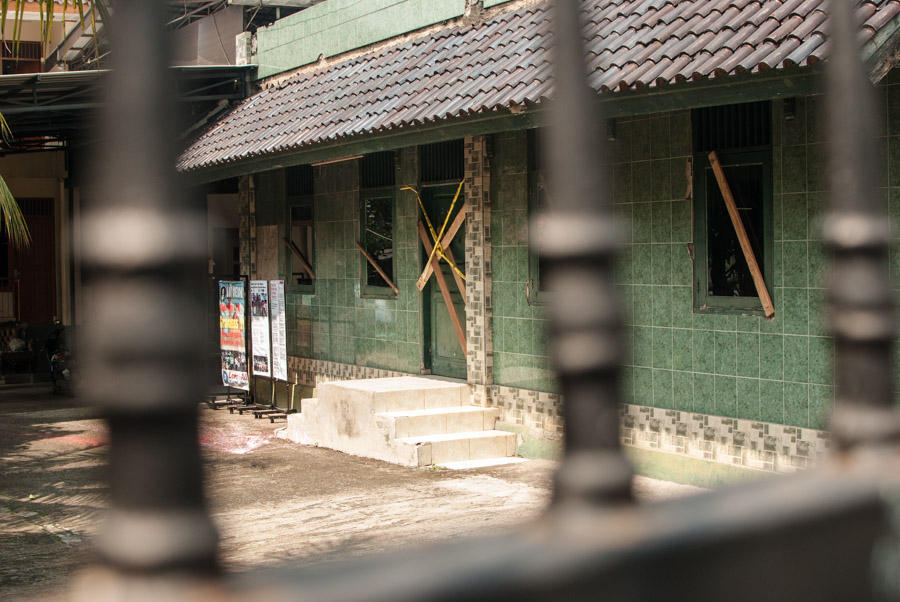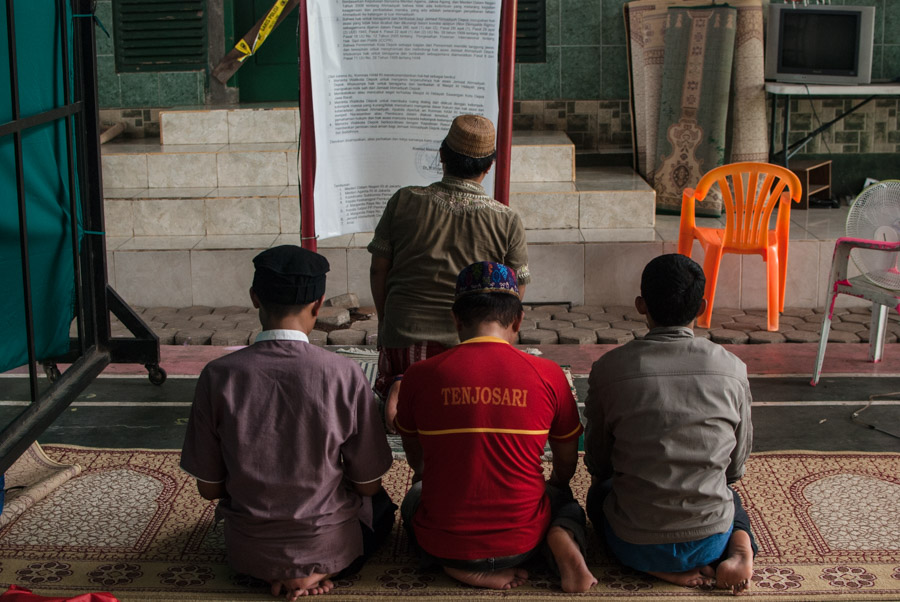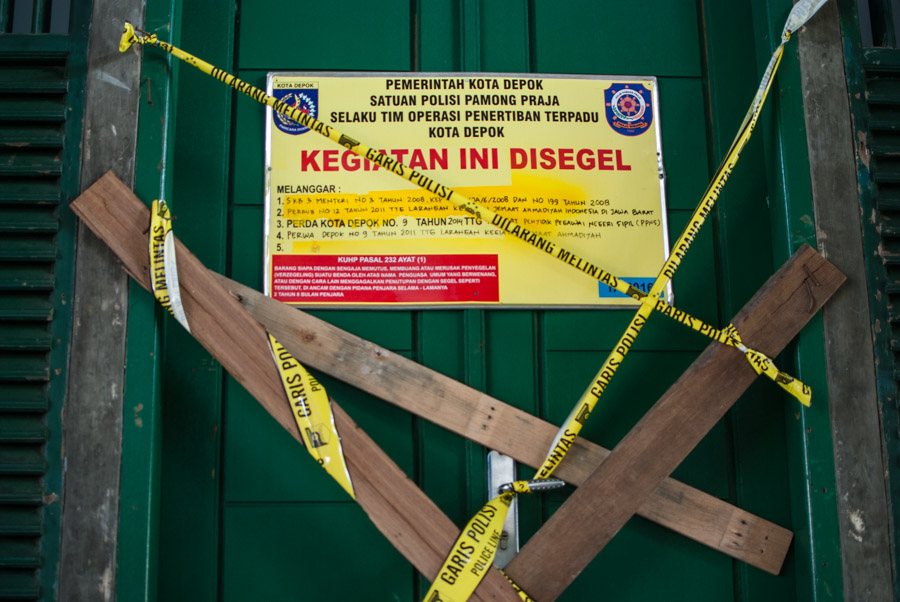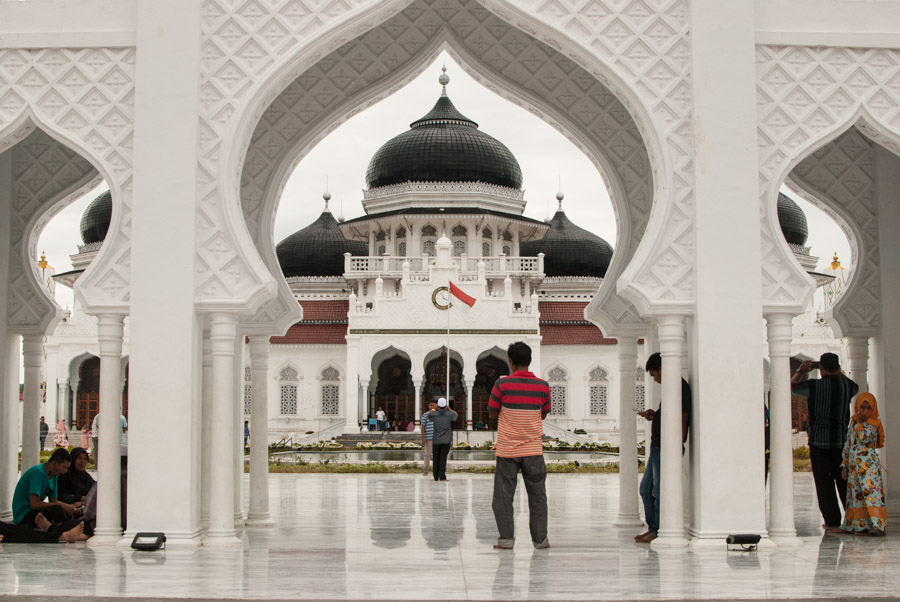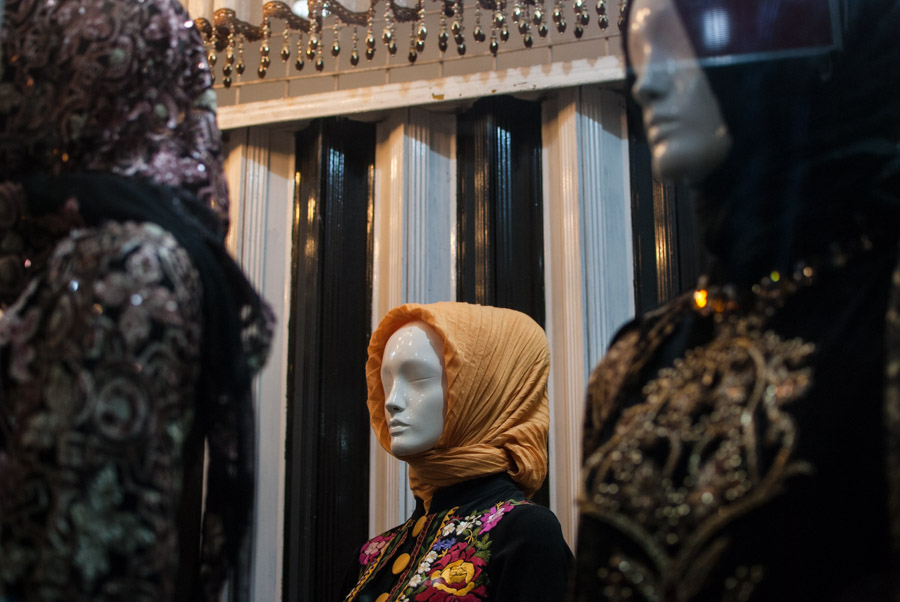For decades, Indonesian society has experienced a slow process of Islamization. In 2017, the pace picked up.
JAKARTA – Five months after its closure, the doors of the Al Hidayah mosque were sealed with wooden planks and crisscrossed with yellow police tape, as if it some kind of grisly crime had taken place within. Barred from entering their house of worship by official order, four young men held their midday prayer in the heat outside, their bodies bent towards a large sign driven into the concrete by the local authorities. Its message was emblazoned in red: “Activities are banned.”
In February, police converged on this green-tiled mosque in Depok, 15 kilometers south of the Indonesian capital Jakarta, to enforce an order sealing off the building until further notice. The order followed a clamor from Islamic fundamentalists, who held protests calling for the expulsion of this small congregation of Ahmadi Muslims from the district. “We had a permit to build this mosque, so we have no idea why they sealed it,” said Abdul Gofur, 42, the caretaker of the site.
The unpretentious Al-Hidayah mosque, a box-like building lacking the otherworldly dome and minaret of many Muslim houses of worship, has a long history of run-ins with the local authorities. Gofur said the mosque had been “sealed” six times since 2011, and has survived a concerted campaign from hardline vigilante groups, including the notorious Islamic Defenders Front, or FPI, which sees Ahmadis as heretics and apostates.
On June 23, two nights before Idul Fitri (as Eid al-Fitr is known in Indonesia), the festival marking the end of the fasting month of Ramadan, Gofur said that white-robed militants pelted the building with eggs and paint, and strung up spray-painted banners calling for the expulsion of the Ahmadiyah. The 400-strong congregation has erected its own signs reading, “Love for All, Hatred for None.”
The Ahmadi minority numbers around 500,000 people scattered across this island nation of 260 million. The sect is not officially recognized in Indonesia, which acknowledges just six religions: Islam, Protestantism, Catholicism, Hinduism, Buddhism, and Confucianism. While most Ahmadiyah see themselves as Muslims, they cleave to unorthodox tenets: the sect has its own holy text, the Tadzkirah, and does not regard Muhammad as the final prophet – a belief that many Indonesians see as heresy. As a result, they have become both a subject of official discrimination, and a target for religious vigilantes.
Things got particularly bad after 2007, when a leading clerical body declared the Ahmadiyah a deviant sect; the following year, then-President Susilo Bambang Yudhoyono signed a decree banning Ahmadi Muslims from disseminating their faith. Following the decree, mosques were shuttered and burned, and members of the community were subject to violent attacks. In February 2011, west of Jakarta in Banten province, three Ahmadi men were beaten to death by a mob; the perpetrators received only light sentences. According to the Jakarta-based Setara Institute for Democracy and Peace, which monitors religious freedom in Indonesia, there have been a total of 546 violent incidents against Ahmadi Muslims since 2007.
“The Ahmadiyah have become a public enemy for most of the Muslim community,” said Yendra Budiana, the spokesperson of the Ahmadiyah Muslim Community. While physical attacks have declined in the past few years, Budiana said, this has been replaced by various forms of administrative discrimination: militants have manipulated laws to force the closure of more than 20 Ahmadi mosques; a local regulation also requires that Ahmadi Muslims renounce their faith to obtain national identification cards, which are critical to accessing a range of government services.
Budiana said that militant groups seem to be treated softly by the provincial government in West Java and the regency government in Depok, both of which are currently under the control of the reactionary Islamist Prosperous Justice Party, or PKS. “We think there is some collaboration with the intolerance organizations and the local government to ban our mosques,” he said. (Idris Abdul Somad, the PKS mayor of Depok, declined a request for an interview).
Despite all the obstacles, the Ahmadiyah of Depok continue to assert their right to worship freely. “No one should ban anyone from practicing their religion,” said Rayhan Firdaus, 21, after finishing the midday prayer. “It’s mentioned in the Quran. Every Muslim including the radicals should follow that.” And sure enough, outside the Al-Hidayah mosque, facing onto a busy street, the congregants have hung a large sheet containing a translated passage from the Quran (al-Baqarah, verse 114), warning their persecutors of cosmic retribution:
And who are more unjust than those who prevent the name of Allah from being mentioned in His mosques and strive toward their destruction? It is not for them to enter them except in fear. For them in this world is disgrace, and they will have in the Hereafter a great punishment.
The ongoing persecution of Ahmadi Muslims is just one sign of the creeping rise of religious intolerance and fundamentalism in Indonesia, the world’s largest Muslim-majority country. While strict, “modernist” interpretations of Islam have been part of the religious mix in Indonesia since colonial times, the growth of fundamentalism has been particularly marked since the collapse of Suharto’s New Order regime in 1998. Many now fear that the emergence of a new Islamic identity politics poses an existential threat to the country’s reputation for diversity and relative tolerance.
This fundamentalism was encapsulated by the campaign against Basuki Tjahaja Purnama, the former governor of Jakarta, who was imprisoned for blasphemy in May. Better known by his nickname “Ahok,” the 51-year-old was both ethnic Chinese and Christian – the first such “double minority” to govern Indonesia’s capital since the 1960s.
In September 2016, his reelection campaign became the center of a sectarian storm after he referenced a passage of the Quran during a campaign speech. (In essence, Ahok was telling people to ignore political arguments that non-Muslims should not be allowed to govern Muslims).
When an edited version of the speech went viral, hardline Islamic groups like the FPI and Hizbut Tahrir rallied hundreds of thousands of protesters to gather in central Jakarta calling for Ahok to be jailed for blasphemy. Charges were leveled. After losing an April 19 runoff election to his opponent Anies Baswedan, a former Minister of Education and Culture who played the religious card adroitly, a court found Ahok guilty of the blasphemy charge and sentenced him to two years in prison.
On one level, there was nothing particularly new in the Ahok controversy. While the Jakarta election and its aftermath garnered global media attention, it was not the first time that ambitious politicians had allied with Islamic organizations in order to advance their careers. Nonetheless, for many observers, Ahok’s case represented a watershed of ethnic and sectarian intolerance. “We saw Ahok’s case as the tipping point; before it was an undercurrent,” said Alissa Wahid, the director of the Gusdurian Network Indonesia, which works to promote interfaith dialogue. “We were always afraid of this growing intolerance.”
The forces of Islamic reaction are nothing new in Indonesia, but in 2017, a chasm seemed to open between the country’s claims to represent a tolerant, pluralistic tradition – one embodied in its national motto Bhinneka Tunggal Ika (“unity in diversity”) – and the strident claims of fundamentalist Islam.
The forces that brought down Jakarta’s governor in 2017 have deep roots in Indonesian history. In some ways, the story begins as far back as the early 13th century, with the trade-born arrival of Islam in Aceh, a devout region on the western tip of Sumatra that even today is referred to as serambi Mekkah – the “balcony of Mecca.” Over the subsequent 400 years, as Islam spread gradually throughout the Malay archipelago, it melded with indigenous religious practices, as well as later imports like Buddhism and Hinduism. This was particularly the case in Java, the most populous island of the archipelago. By the 1700s there had emerged what the historian M.C. Ricklefs has described as a “mystical synthesis” of Islam and pre-Islamic Javanese traditions – a reconciliation between two differing identities and belief systems.
As Islam spread it also deepened, a process that was accelerated by the onset of globalized industrial modernity under Dutch colonial rule in the 19th century. Among many other things, this better connected Indonesian Muslims to a global body of Islamic ideas and religious scholarship. Steamships (and later, air travel) allowed more Indonesian Muslims to undertake the hajj, and for Indonesian ulama (religious scholars) to study in the famed Islamic universities of Mecca and Cairo.
In this way, modern religious currents from the Middle East, including the austere 18th century Wahhabi reform movement of the Arabian peninsula, found their way into the Malay world. And over time, the religious synthesis that existed in rural Java was transformed by a slow and contested process of Islamization that continues up to the present. “The process of Islamization in Indonesia was not a one-step project,” said Ulil Abshar-Abdallah, the co-founder of the Liberal Islam Network. “It’s still going on until today.”
In his 2010 book Understanding Islam in Indonesia: Politics and Diversity, Robert Pringle described the modern history of Indonesian Islam as one of “fluctuation and tension” between two broad currents of Islamic thought: a “traditionalist” vision, in which Islam coexists comfortably with a range of Indonesian traditions; and a more legalistic “reformist” (or “modernist”) stream, which emphasizes “the requirements of doctrine as interpreted by the latest trends in global Islam.”
Historically, these streams have been roughly represented by Indonesia’s two mainstream Islamic organizations: Muhammadiyah, founded in 1912 as a modernist organization dedicated to the purification of Indonesian Islam from syncretic tendencies; and Nahdlatul Ulama, or NU, established in 1926 as a bulwark against the rise of Wahhabism in the Arabian peninsula and the growing presence of religious purism at home. Today, both organizations have memberships reaching into the tens of millions.
This brief historical excursus is important in order to understand the dramatic changes that took place under Suharto’s dictatorship in the 1970s and 1980s. Although the New Order suppressed hardline fundamentalist groups as a possible threat to Suharto’s rule, it was also a time of booming economic growth, urbanization, and growing religious observance. These decades saw the beginning of a massive flow of Saudi petro-dollars into Indonesia, which helped instill Riyadh’s strict brand of Salafi Islam. Together, these two forces would fortify the “reformist” tendency of Indonesian Islam at the expense of the more tolerant, “traditionalist” one.
When Suharto fell from power amid mass pro-democracy protests in 1998, fundamentalist Islamic groups were among the many forces that rushed in to fill the political vacuum. Abshar-Abdallah said that local traditions and cultural practices were increasingly losing out against a kind of “Islamic globalization” – a homogenizing tendency enforced by a flood of Gulf state funding, and its world-spanning networks of Islamic preachers, scholars, websites, and publishing houses. Since the 1980s, the Saudi government has funneled billions of dollars into Indonesia, building mosques, pesantren (Islamic boarding schools), and Arabic language institutes.
A key vector of Saudi influence in Indonesia is the Institute for the Study of Islam and Arabic, or LIPIA. Founded in 1980, this exclusive – and fully Saudi-funded – university in South Jakarta counts among its alumni several generations of prominent Islamic radicals. These include Habib Rizieq, the rabid leader of the FPI, who attended LIPIA before gaining a Saudi state scholarship to continue his studies in Riyadh; and Hidayat Nur Wahid, the onetime leader of PKS. Another notable alumnus is Jafar Umar Thalib, who founded the now-disbanded extremist outfit Laskar Jihad. Meanwhile, graduates have gone on to establish satellite pesantren that further disseminate a brand of Salafism that is openly hostile to traditional Islamic practices. Abshar-Abdallah, who studied at LIPIA in the 1990s, said that the college was “instrumental in the spread of Salafism in Indonesia.”
One symptom of this change has been the dramatic increase in Islamic observance by ordinary Indonesians, particularly in the large cities, and the adoption of more austere forms of dress, including the jilbab, a head-to-toe covering worn by women. Another, Abshar-Abdallah said, has been the gradual replacement of Indonesian or Javanese words for Islamic rituals with Arabic equivalents. In recent decades, the Javanese term puasa (fasting) has increasingly given way to the Arabic sawm; instead of engaging in sembahyang (prayer), pious Indonesians now undertake salat. “People are distancing themselves from the local practices, adopting more Middle Eastern cultural practices,” Abshar-Abdallah said.
The outcome of all this is an increasing public tolerance for – if not always active support of – fundamentalist visions of Indonesian society. Vigilante groups like FPI have waged an active campaign for the passage of sharia-based by-laws and regulations, dozens of which have been successfully introduced across the archipelago. (Sharia law has also been fully introduced in the province of Aceh). They have also increased the pressure on Indonesia’s minority groups, a broad category that includes Christians, minority Muslim sects like the Ahmadiyah, progressive student groups, and the LGBT community. Since President Joko Widodo, also known as Jokowi, took office in 2014, there has been a marked increase in violent incidents against minorities. The Setara Institute recorded 270 cases of religious violence in 2016, and 236 cases in 2015 – the first two full years of Jokowi’s presidency – compared with 180 in 2014.
Alissa Wahid, the daughter of the late former president Abdurrahman Wahid, a prominent member of NU, said that while much international media coverage of Indonesian Islam focuses on attacks by violent extremists, such as last year’s attack on a Starbucks in central Jakarta that left seven dead, the creeping intolerance among the general population arguably poses a more serious threat to the country’s democracy. “This is more dangerous than terrorism,” she said. “It’s a different matter when you talk about Bangladesh, but in Indonesia, the challenge will be this social shift.”
—
On a steamy day in July, I traveled out to a musty office building in South Jakarta to meet Habib Muchsin Alatas, the chairman of the shura council of the Islamic Defenders Front (FPI), the organization’s top decision-making body. Dressed in a white Salafi robe and grey turban, with a wide face and booming voice, Alatas was a physically imposing figure, an impression that was only accentuated by his perch in the middle of a broad, glass-topped CEO desk. On his left hand he wore a deep red stone set in a silver ring.
It wasn’t long before we got to the topic of Ahok, whose prosecution for blasphemy was enthusiastically cheered on by FPI and its fundamentalist allies. Alatas described Ahok’s two-year prison sentence as “a little bit unfair”; his organization had pushed for five years, the maximum allowed under the law. “This is not about Ahok being a non-Muslim,” he said, as his various assistants proffered sealed cups of water and a plate of fried snacks and sweet rice cakes. For Alatas, Islam has been central to Indonesian nationhood since its founding; he said Ahok’s “blasphemous” comments threatened to inspire leaders elsewhere in Indonesia, precipitating a general breakdown in religious morality.
“If we are tolerant to Ahok, then other leaders will do the same. That’s why Ahok was dangerous,” he said.
There was another element at play, too: that the governor was working for the advancement of his ancestral homeland. Alatas alleged that Ahok was a “martyr for the grand designs of Chinese imperialism” in Indonesia. “And you know China is communist, anti-religion, anti-God,” he continued. “It’s like the opposite of Indonesia.”
The rise of FPI exemplifies the general growth of Islamic fundamentalism in Indonesia over the past decade. Founded in late 1998 by a coterie of army generals as a force to combat prodemocracy protesters, the group has since become notorious for its aggressive “sweeping” operations, in which swarms of white-robed thugs descend on bars and clubs, or attempt to break up “un-Islamic” public events and film-screenings. Alatas admitted that FPI sometimes took the law into its own hands when the police failed to “enforce the law,” but he said the group had been unfairly maligned by the international media, which never talked about the organization’s charity work. The reason for this, he alleged, was simple: “80 percent of the shares in television and media are owned by Chinese.”
The Islamic political firmament in Indonesia contains many diverse and overlapping constellations. These run the gamut from mainstream groups like NU and Muhammadiyah, to the street brawlers of FPI and a range of formal Islamic parties such as PKS. Alongside these groups sit myriad Islamist sects and activist groups. There are the local franchises of global Islamist groups like Hizbut Tahrir, which supports the replacement of Indonesia’s pluralist democracy with a sharia-based Islamic caliphate, and, far out on the fringes of the political galaxy, a smattering of violent extremists pledging their loyalty to al-Qaeda and the Islamic State.
Even on the puritan end of the spectrum, these groups are far from homogeneous. They hew to a wide variety of doctrinal and strategic positions, and often pursue mutually contradictory goals. But one issue most could unite behind was the campaign to bring down Jakarta’s governor.
Ahok was in many ways an ideal target. For one thing, he was ethnic Chinese, a mostly non-Muslim minority group that has long been perceived as occupying a privileged position in Indonesian society. For another, he was brash and polarizing, even before he took over as governor from his predecessor Jokowi, when the latter was elected president in 2014. Ahok’s critics blamed him for clearing thousands of urban poor from riverbanks in Jakarta, waving away the concerns of evicted residents and human rights groups. As governor, he also courted controversy with devout Muslims: last year, he prohibited Jakarta’s public schools from requiring female Muslim students to wear a headscarf, likening the Islamic head coverings to “the napkin in my kitchen.”
Charlotte Setijadi, a visiting fellow at the ISEAS-Yusof Ishak Institute in Singapore, said that Ahok became the end-point for a converging stream of fundamentalist tropes and ethnically-tinged economic resentments. “Having an ethnic Chinese governor with perceived ties to real estate tycoons that are also ethnic Chinese could only feed into already growing anger,” she said, “particularly when said governor allegedly insulted the Quran.”
Behind the anti-Ahok movement lay a marriage of convenience between religious fundamentalists and conservative political interests. In a recent article, Leo Suryadinata, another researcher at the ISEAS-Yusof Ishak Institute, argued that the swirl of Islamic rhetoric concealed an “ideological war” pitting a series of entrenched political and economic interests against reformists like Jokowi and Ahok. “The entrenched interests are using Islam (including the militant version of the religion and its adherents) to counter the reformists, as it is difficult, if not impossible, to get rid of the reformists using just secular issues,” wrote Suryadinata.
Heading this old guard is Prabowo Subianto, a Suharto-era general who lost to Jokowi in the 2014 presidential election, and gave vocal support to Anies Baswedan in his campaign against Ahok. The very embodiment of the old military-dominated order – Prabowo was also a former son-in-law of Suharto – he is widely expected to challenge Jokowi again in the 2019 national election. Already Anies is rumored as a likely running mate. Bonnie Triyana, a historian who edits the monthly magazine Historia, said that the Ahok case was “a moment when historical memories came together with political vested interests.”
While these elements in the anti-Ahok coalition don’t necessarily support the hardline agenda of FPI and its allies, the opportunistic manipulation of religious sentiment could have real-world impacts. Some activists already speak of a discernible “Ahok effect” – an illiberal turn that followed directly from the election controversies.
The Southeast Asia Freedom of Expression Network (SAFENET), has documented an alarming spike in a new form of online bullying, in which Islamic militants target Facebook users who have posted comments critical of Islam or conservative Islamic leaders. “They put their names on social media, and then the FPI will come to their office or their house,” said Damar Juniarto, SAFENET’s Jakarta-based regional coordinator. If things get that far, the target is then hauled out and frog-marched to the local police station, where militants seek to have them charged under Indonesia’s blasphemy law, or its Electronic Information and Transaction Law. (Article 28.2 of the latter forbids the transmission of any information that inflicts “hatred or dissension” against religious, ethnic, or racial groups).
These campaigns are initiated by shadowy online groups with names like the “Muslim Cyber Army” and the “Team for Hunting Religious Insults” (Team Pemburu Penista Agama). Juniarto said that these groups first identified potential targets, whose names and photos are then disseminated via social media. He showed me one video that featured a slideshow of social media profiles of people it described as “fugitives” (buronan) of Islam. To the accompaniment of canned dramatic music, the video flashed a screenshot of a Facebook profile belonging to an ethnic Chinese man accused of spreading slander against FPI leader Habib Rizieq; then there was a photo of another man accused of printing bread packaging with a Quranic verse. “Hello Mr. Police,” read the caption beneath it, “this person needs to be arrested.” The video closed with an image of a soaring eagle, a gun’s crosshairs, and a message: Insulters of religion and ulama, we will hunt you down even if you’re hidden in a rat hole.
Between January and the first week of June, SAFENET documented 88 cases in which netizens were targeted for real-world punishment by militants; the number peaked in May and June, right around the time of Ahok’s conviction. In one case documented by the organization, a 15-year-old from Bekasi, to the east of Jakarta, was confronted by vigilantes and forced to read out a letter of apology to the “Muslim community” for critical comments he made on Facebook; in a video of the incident, he reads in a shaky voice as his assailants shout and jeer. While just 12 of the 88 cases ended up in court, Juniarto said it was a worrying trend. “It’s like they have extra power after seeing Ahok sentenced,” he said.
Now that it has been proven that religion can be a successful wedge issue, Indonesian liberals fear that the coalition of Islamists and populists that brought down Ahok will now turn their fire on a bigger target: President Jokowi, who is up for re-election in 2019. For this reason, Ulil Abshar-Abdallah of the Liberal Islam Network described the Jakarta election as a “watershed” in Indonesia’s political history. “It’s created polarization in society,” he said. “For me it’s serious. Never before in the history of democratization in Indonesia have we had such polarization.”
This polarization has put particular pressure on the NU and Muhammadiyah, the two organizations that have historically occupied the broad middle-ground of Indonesian Islam. To be sure, both remain enormously influential, together claiming to represent some 75 million Indonesians, and providing a wide range of social services in far-flung corners of the country. But they seem to have been caught off guard by the sudden successes of Islamic street politics. While NU and Muhammadiyah leaders refused to endorse the mass protests against Ahok in late 2016, some of their members attended the rallies anyway, while others even went so far as to join groups like FPI leading the protests.
According to some, by trying to remain “above” active politics, NU and Muhammadiyah have unwittingly ceded terrain to groups like FPI, which have cleverly positioned themselves within Indonesia’s nationalist tradition. FPI, for instance, has expressed its opposition to the establishment of a global Islamic caliphate, something that alienates many Indonesian Muslims. Like the Donald Trump campaign in the United States, it has mixed identity politics with appeals to the economic anxieties of ordinary Indonesians, such as those evicted during the Jakarta slum clearances overseen by Ahok’s government.
Another reason for their success is messaging. In the world of wired communication that now dominates the lives of so many Indonesians, moderate voices increasingly find themselves on the margins. “If you Google a word like jihad, Google will direct you to radical websites,” said Savic Ali, a young NU member who runs the organization’s website as well as Nutizen, a new streaming video platform. He said that of the top 20 Islam-themed websites in Indonesia, there is only one “moderate” site: NU’s own website, which sits at number five. “They are more organized,” he said of the fundamentalists’ online efforts, “and they are more popular.”
Ali said that the priority for moderate organizations was to learn to tailor their messages to a generation weaned on streaming video and quick-bite social media grabs. “Young generations are more comfortable with videos – if we don’t create videos, then the young generation will learn about Islam from the Salafi media,” he said. Ali continued: “We have a problem with what we call the silent majority. Actually we believe that most Indonesian Muslims are moderate, but they are silent.”
—
Despite all of these challenges, rumors of the death of Indonesian democracy may well be exaggerated. For one thing, such a prognosis overlooks just how unique – and possibly unrepeatable – were the confluence of interests and circumstances that brought about Ahok’s downfall. Writing shortly after his conviction, Aaron Connelly and Matthew Busch of Sydney’s Lowy Institute for International Affairs cast doubt on whether the coalition that brought down Ahok would be able to replicate its successes against Jokowi in 2019. In addition to enjoying the financial and political advantages of incumbency, they argued, the president is Javanese rather than Chinese, a Muslim rather than a Christian, both of which would make it more difficult to mobilize opposition against him on ethnic or religious grounds. During the 2014 election, attempts by far-right elements to tar Jokowi with a treasonous trifecta – that he was Chinese, Christian, and the offspring of communists – did little to prevent his ultimate victory.
While Ahok’s jailing was a serious setback for tolerance and liberal values in Indonesia, it’s also easy to overstate how moderate Indonesian Islam was in the first place, and how much less moderate ordinary people have become. To start with, even “moderate” Islamic organizations like NU have always included in their ranks leaders holding conservative values on issues such as women’s rights and the position of minorities. Ahok had a very high profile, but he was just one of the more than 100 case of blasphemy prosecuted since 2004. Furthermore, despite the increasing visibility of Islamic fundamentalism, support for explicitly Islamic parties remains stagnant. Since the 1999 election, the “Islamic vote” has hovered around a third of the total, often split among half a dozen or more different parties. On its own, the reactionary PKS has never gained more than 8 percent.
This suggests that while a lot of ordinary people opposed Ahok, it by no means follows that they all support the introduction of sharia or the creation of an Islamic state in Indonesia. It also suggests that over time, there is a good likelihood that Indonesian democracy will simply revert to its raucous, messy (and not necessarily liberal) mean. As Jokowi put it in an interview with Reuters in July, “Pluralism has always been part of Indonesia’s DNA” – even if liberalism hasn’t.
Indeed, more lasting threats could well come from Jokowi’s own illiberal attempts to safeguard the moderate tradition. In May, Indonesian police charged FPI supremo Habib Rizieq with violating anti-pornography laws – the same type of illiberal, sharia-inspired law that Rizieq himself has been advocating for years. (He quickly scuttled off to Saudi Arabia to avoid prosecution). Two months later, the government announced it was banning the Islamist group Hizbut Tahrir, under a controversial presidential decree giving officials the authority to disband organisations deemed to threaten “national unity.”
The New York-based advocacy group Human Rights Watch condemned the latter move, which enjoyed support from 14 moderate Islamic organizations, as “a troubling violation of universal rights to freedom of association and expression” – one that echoed a repressive ban on communism introduced at the start of Suharto’s rule in the mid-1960s. “Banning any organization strictly on ideological grounds,” it argued, “is a draconian action that undermines rights of freedom of association and expression that Indonesians have fought hard to establish since the end of the Suharto dictatorship in 1998.”
Whatever happens, Ulil Abshar-Abdallah said that the tension between Indonesian and global currents will persist. Over time, however, he expressed a quiet faith that Indonesia’s traditions, with all their complications and contradictions, would survive the pressures of globalization, both Islamic and secular, as they have already for more than a century.
“I believe that in the long run, that if Salafism exists here for 50 years or 100 years, it will be forced to adapt,” he said. “On the surface, the local tradition seems to be losing from time to time,” he added, “but they have certain ways of absorbing the great tradition.”
Published in The Diplomat, September 2017
Reporting for this story was supported by a grant from the International Reporting Project.


